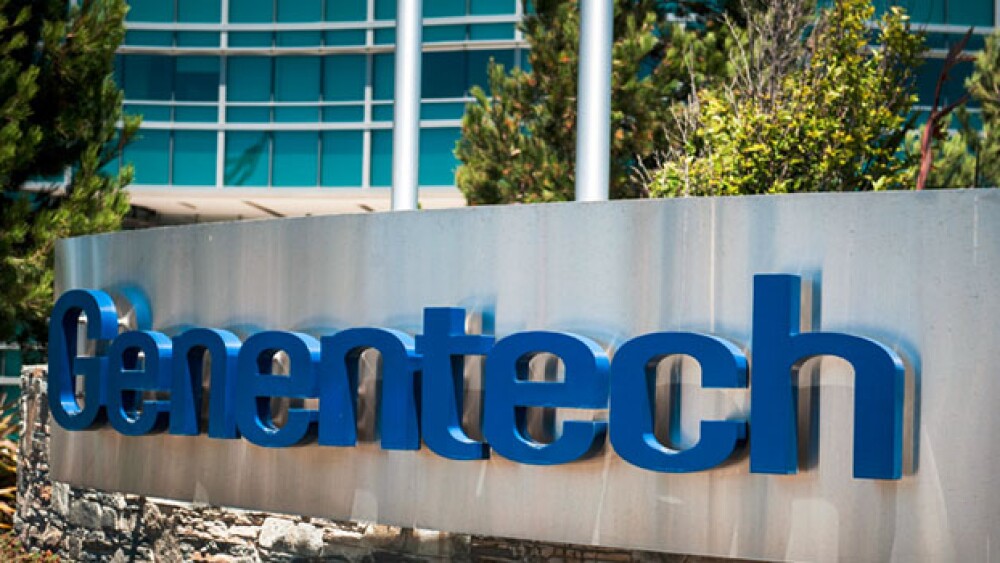This deal is an expansion of an existing discovery collaboration. Immunocore will head the first-in-human clinical trial of the drug alone and in combination with Genentech’s checkpoint inhibitor Tecentriq (atezolizumab).
Oxford, UK-based Immunocore has agreed to a new partnership with Genentech, a Roche company, to co-develop one of Immunocore’s drug candidates, IMC-C103C.
IMC-C103C is an ImmTAC molecule that targets a protein called Melanoma-Associated Antigen A4 (MAGE-A4). They will investigate the compound in a variety of solid tumors.
This deal is an expansion of an existing discovery collaboration. Immunocore will head the first-in-human clinical trial of the drug alone and in combination with Genentech’s checkpoint inhibitor Tecentriq (atezolizumab). That trial is expected to initiate in early 2019.
Genentech is paying Immunocore $100 million upfront and near-term milestone payments. Once proof-of-concept data is available, Immunocore will have the option to continue to co-develop IMC-C103C through commercialization or to license it to Genentech for royalties and milestone payments.
“MAGE-A4 is a known cancer-associated antigen expressed in a wide range of malignancies,” stated Andrew Hotchkiss, chief executive officer of Immunocore. “Genentech is a leader in oncology with extensive immunology expertise, with whom we’ve had a good collaborative relationship for several years. We look forward to embarking upon this partnership to investigate whether IMC-C103C could ultimately improve the lives of people with MAGE-A4 positive cancers.”
The two companies’ original collaboration was signed in 2013. Immunocore has a collection of partnerships with AstraZeneca, GlaxoSmithKline, Eli Lilly, Roche and the Bill & Melinda Gates Foundation.
In August, Immunocore announced it had dosed the first patient in a Phase I clinical trial, part of its ongoing collaboration with GSK, of IMCnyeso. This is also an ImmTAC molecule. It is being tested in patients with non-small cell lung cancer (NSCLC), bladder cancer, melanoma and synovial sarcoma that are positive for NY-ESO-1 and/or LAGE-1A. That first patient being treated triggered an undisclosed milestone payment to Immunocore.
The collaboration with GSK was also launched in 2013. ImmTAC stands for Immune mobilizing monoclonal TCRs against cancer. They are a new class of bi-specific biologics that are designed to overcome limitations of other immuno-oncology therapeutics by combining a T cell receptor (TCR)-targeting system with an anti-CD3 effector capability. This activates a potent and specific T cell response to cancer cells.
The company is working in three therapeutic areas: oncology, infectious disease, and autoimmune diseases. In infectious disease, the company applies its TCR technology platform against viruses or bacteria (ImmTAV or ImmTAB). Its initial focus is on HIV, chronic Hepatitis B and Tuberculosis (TB).
In autoimmune diseases, the ImmTAAI (immune mobilizing monoclonal TCRs against autoimmune disease) molecules are made up of a targeted TCR fused to an effector function that can selectively trigger immune suppression in a tissue of interest.
In oncology, Immunocore also has IMCgp100 that it is investigating in metastatic uveal melanoma. At the American Society of Clinical Oncology (ASCO) Annual Meeting in June, the company presented data from the trial showing it had a durable tumor response with a median follow-up of 19.1 months and hadn’t yet reached median overall survival (OS). This is a Phase I study and is a wholly-owned program for the company.
Uveal melanoma is a rare cancer, but the most common form of adult eye cancer. If it metastasizes beyond the eye, less than half of patients survive for one year. Of the 19 patients enrolled in the study in the Phase I portion of the Phase I/II dose escalation trial, 17 were evaluated for efficacy. Of those treated with IMCgp100, there was an 18 percent response rate and a one-year overall survival rate of 74 percent at the time of data cut-off.





